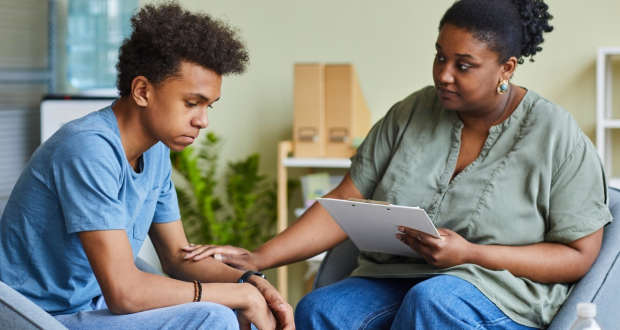Medi-Cal, California’s Medicaid program, covers one in three Californians, including more than 50 percent of the state’s youth. In California, nearly 300,000 youth are coping with depression, and 66 percent of them do not get the help they need, according to Governor Newsom’s Master Plan for Kids’ Mental Health.
Black children and children of color make up nearly 75 percent of children on Medi-Cal, yet they face significant barriers to accessing mental health services. Despite an overall decline in the suicide rate in California, youth — particularly Black, Latino, and female Californians — have seen disproportionate increases in suicide rates. According to data from 2022, about 4.3 percent of low-income teens on Medi-Cal have undergone depression screenings and received follow-up treatment. Among Indigenous youth, the screening rate is a little more than half that (2.3 percent). However, more screenings are probably occurring that are not being reported due to data capture issues.
To improve access to Medi-Cal mental health services, DHCS implemented a “No Wrong Door” approach to seeking care. In other words, any Medi-Cal member can receive timely access to covered mental health services regardless of where they first seek care, whether at a county mental health office or their Medi-Cal health plan.
Medi-Cal Covered Mental Health Services
Medi-Cal covers a wide range of services to support the emotional, psychological, and social needs of members. Medi-Cal can cover such services as:
- Individual, group, and family therapy
- Crisis counseling
- Case management
- Medication for mental health conditions
- Depression and anxiety screenings
- Drug and alcohol treatment services
- Other treatments for significant or complex mental health as necessary
Paula Wilhelm, Deputy Director for Behavioral Health at the California Department of Health Care Services (DHCS), emphasized the state’s commitment to transforming behavioral health services, which covers both mental health and substance use disorder treatment, under Medi-Cal.
“Mental health is just as important as physical health, and all of our health outcomes are intertwined,” Wilhelm said. “DHCS is partnering with health plans and care providers to transform the way behavioral health services are delivered to Medi-Cal members.”
Governor Gavin Newsom’s Children and Youth Behavioral Health Initiative (CYBHI) is a monumental investment in strengthening mental health services for young Californians. This initiative focuses on prevention, wellness, screening, assessment, outpatient, and community-based treatment.
Mental Health Virtual Services Apps
In January 2024, DHCS, in collaboration with Kooth and Brightline, launched two mental health virtual services platforms, which you can download as android and apple apps, BrightLife Kids for children aged 0-12 and Soluna for teenagers and young adults aged 13-25.
These platforms connect individuals to free coaching and provide educational content, assessment tools, care navigation services, peer communities, and crisis and safety protocols to all California youth and their families, regardless of insurance coverage.
These services aim to complement existing mental health services by offering additional care options and resources for parents, caregivers, children, youth, and young adults in California. If you experience long wait times to see a mental health counselor, check out these apps to connect to individual or group coaching.
Get Started Today
If you or your child need mental health services, contact your Medi-Cal health plan, which will assess your needs and refer you to get help.
In Riverside County and San Bernardino County, Medi-Cal members can contact:
* Inland Empire Health Plan: 800-440-4347
* Kaiser Permanente: 855-839-7613
* Molina HealthCare of California Partner Plan, Inc.: 888-665-4621
 Westside Story Newspaper – Online The News of The Empire – Sharing the Quest for Excellence
Westside Story Newspaper – Online The News of The Empire – Sharing the Quest for Excellence





